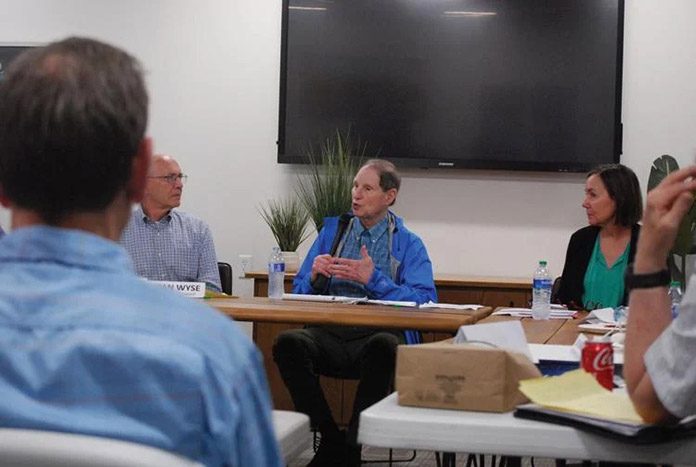
U.S. Sen. Ron Wyden met Thursday, Aug. 3, with Eastern Oregon agriculture leaders and processors at the SAGE Center to discuss ways he could help as chair of the Senate Finance Committee, continue to generate regional jobs and grow their export markets overseas.
“Oregon does many things well,” he said, “especially by growing things, and you can see that here in Eastern Oregon. We have growers, chippers and processors, and they really want the government to focus on the kinds of policies that are going to make things more productive.”
Among other challenges discussed at the roundtable session were affordable housing, immigration and worldwide tariffs.
Boardman Chamber of Commerce Director Torrie Griggs brought up housing, stating that roughly 67% of the the city’s workforce comes from other areas because they either can’t afford or don’t have residences in Boardman. She said the average cost of a home within city limits was around $350,000.
Wyden responded by mentioning his March reintroduction of the Decent, Affordable, Safe Housing for All (DASH) Act, which aims to help low- and middle-income families face the housing affordability crisis.
Patrick Maag, director of continuous improvement and maintenance with Boardman Foods Inc., mentioned how much of the industry runs with the assistance of immigrants.
“The labor that supports all of the things that come into our factories and grocery stores (is) largely run on the backs of immigrants,” he said. “How do we allow those people to, maybe, earn a spot to stay in this country, if that’s what they want to do? That sector of the labor force is also super critical to everybody here.”
Brian Jackson, Lamb Weston plant manager, brought up tariffs when trading worldwide.
“As we grow internationally, as we grow our operations here locally, a lot of our products ship internationally,” he said. “When we look at tariffs worldwide, we have competitors in Europe that can ship products to South Korea or Vietnam much cheaper than we can here locally, so we look at our strategic plan, those are things that we would like to be able to do.”
“We have to have a trade policy that is much more flexible, and tariffs are not the only solution,” Wyden replied. “Tariffs are too inflexible to meet the needs of modern exports.”










